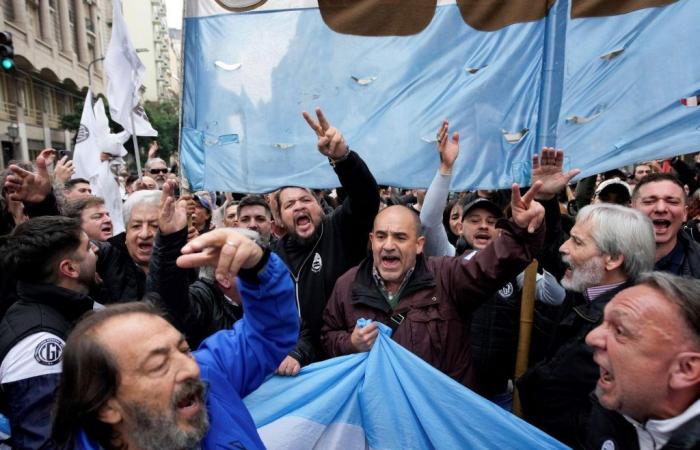In the streets of Buenos Aires, demonstrators confronted the police this Wednesday (June 12, 2024). Thousands of people camped in front of Parliament to denounce Javier Milei’s “Omnibus” reform: a forced liberalization of the country’s entire economy, and major budget cuts in public services.
The vote on these measures this Wednesday in the Senate and the violence which marked the demonstrations made the front page of the Argentine press. Clarin And Rio Negro show the same car on fire in front of Parliament – Clarin adds that President Javier Milei denounces an attempted coup d’état. Daily life denounces on the inside pages of “ Kirchnerist and left-wing activists, the attackers with their faces hidden ” who have ” burned cars and trash cans” and threw “molotov cocktails and stones at the police “. And speaks of a “ sudden trip into the past, in an Argentina that a violent minority wants to continue to keep alive “. “ The limits of democracy are crossed », ton El Dia.
In one, Hoy And ElCiudadano show them police officers – and the speech is not the same: “ Repression and barbarity », headlines Hoy. El Ciudadano continues: “ sticks, gas and trucks equipped with water lances, this is the path the government chose to obtain approval of the law “. And the daily repeats Javier Milei’s comments on an attempted coup d’état within the framework of what he calls the ” usual horror show (of the president) on social networks “. “ As if the right to demonstrate had been erased from the Constitution in an instant, the message also called the demonstrators ‘terrorists’ », laments Page 12. “ His speech », affirms the daily in a editorial« tends to achieve impunity by constantly increasing the level of violence “. He ” rejects the popular will » – echoing, El Ciudadano recalls that deputies who were going to join the demonstration were beaten and gassed.
Meanwhile, far, far away, in the Vatican, says daily lifeArgentine Pope Francis had his photo taken with a banner supporting Aerolinas Argentinas, one of the public companies that Javier Milei wants to privatize – the Pope had just met members of the air traffic controllers union.
A very broad mobilization but without effect: after 11 hours of debate, the senators voted for all the reforms wanted by the ultra-liberal president. What will the consequences be ? On RFI Valeria Brusco, professor at the National University of Córdoba and member of the network of women political scientists #NoSinMujeres« not without women »explain that ” in this law, what will have the most important consequences for the government is the so-called regime “ investment ”, which makes investments very easy, very practical and very attractive. Which could be positive, except that these are investments without any regulation, without any tax, without any contribution to the country. » She adds that “ Since the beginning of this government, the IMF has demanded that it make laws regulating these regimes. And this is what the government has so far failed to do. »
The Argentine president against soup kitchens
Javier Milei also has a number of social organizations in his sights. Distributions of food aid to soup kitchens have already been banned, due to an audit, at the request of the president who denounces what he calls the trading of poverty. However, millions of people need this food aid in the working-class neighborhoods where RFI correspondent Théo Conscience visited.
In the Carlos Mugica neighborhood, the largest slum in Buenos Aires, he went to the house of Viviana Rodriguez, who is organizing a meal distribution. Sandra, mother, explains that she started coming recently, “ because of the social and economic situation. I work in the neighborhood market but that’s not enough, I have children and I have to feed them “.
In fact, since the election of Javier Milei, the economic recession and the government’s austerity policy have caused nearly three million Argentines to fall into poverty in six months, according to the Argentine Catholic University. However, Javier Milei suspended food aid last December (2023) to some 45,000 soup kitchens in the country, under the pretext of carrying out an audit of the social organizations that operate them.
The Argentine courts finally intervened to force the government to immediately distribute the food aid in its possession – which it was blocking in warehouses.
In Haiti, Garry Conille installed
In Haiti, the transitional Prime Minister was officially installed this Wednesday (June 12, 2024) during a ceremony at the Villa d’Accueil. In his speech, he depicted the reality of Haiti: violence, insecurity, humanitarian crisis, political instability… The first challenge is security. But Garry Conille also wants to tackle another big challenge: “ to ensure the sustainability of our approach, with a view to securing our nation, our state institutions must be cleaned up and strengthened. »
“ The Prime Minister had the right words, now we wait for the right actions “, comments Frantz Duval, editor-in-chief of the Haitian daily Le Nouvelliste: ” yesterday there was everything that was needed except an announcement, any concrete one, which could alleviate the plight of the population “.
This speech was held before the eyes of the international community, which welcomed the establishment of this new team. “ This is the trap for Garry Conille », believes Frantz Duval: “ is he going to please the international community, the ambassadors who applaud everything and anything – this was the case with Ariel Henry, it was already the case with Jovenel Moïse, or is it that he will put himself at the service of the population, and begin to solve two or three problems which affect the daily lives of Haitians “.
“ Another afternoon of terror ” in Haiti
Haitians were killed and injured in a new ambush by armed gangs in Delmas 24 (northern outskirts), reports Alterpresse. An attack carried out by the Viv ansanm gang, according to testimonies collected by the online news agency. The bandits who had taken shelter in a house opened fire on “ a crowd of citizens who crisscrossed the area “. Sporadic gunfire also paralyzed transport in several areas, including around the Christ Roi district in Port-au-Prince.
Major construction sites gone
The National wonders for its part where the major public works projects have gone. The daily lists these projects planned by the former government of Ariel Henry, particularly roads or sections of road, on the national 3 or the 1. ” No progress “, ” broken promise », deplores Le National which continues: “ In short, where have these amounts allocated to the reconstruction and rehabilitation of roads planned by the government gone? ? Where have also gone the construction costs of around twenty high schools planned across the country including in the metropolitan region of Port-au-Prince? » And the daily calls on the new government to investigate.
Lula, oil and environment
In Brazil, President Lula is the subject of strong criticism, after announcing the launch of a major offshore oil exploration project, near the mouth of the Amazon River. Criticism comes from the country’s environmental organizations, but also from the Minister of the Environment – and the Brazilian Environmental Protection Agency blocked it a year ago, considering that all impact studies were not carried out.
“ We want to do all this legally, respecting the environment, respecting all the rules. But we are not going to miss the slightest opportunity to promote the growth of this country,” President Lula said this Wednesday.
The Journal of the 1st
Have we forgotten the Overseas Territories by calling early legislative elections in France?






